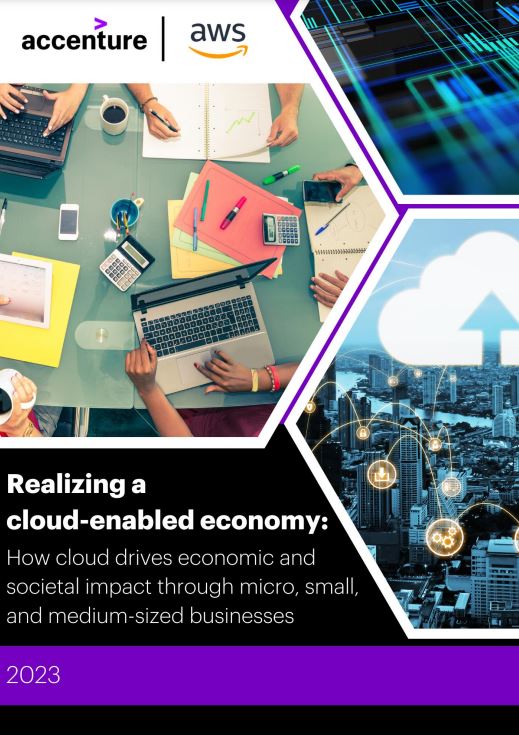Amazon Web Services (AWS), an Amazon.com company, today released a report revealing that micro, small, and medium-sized enterprises (MSMEs) that embrace cloud-enabled technologies in Indonesia are expected to unlock up to 79.6 trillion IDR in annual productivity gains and support 17.6 million jobs across the healthcare, education, and agriculture sectors by 2030, representing an average of 12% of total jobs.
AWS commissioned the report “Realizing a Cloud-enabled Economy: How Cloud Drives Economic and Societal Impact Through Micro, Small, And Medium-Sized Businesses” to examine the potential benefits of moving to the cloud for MSMEs addressing societal issues.

Conducted by global professional services firm Accenture, one of the largest and most mature IT companies in the Philippines, the report uses the Organization for Economic Cooperation and Development’s (OECD) definition of cloud adoption levels to forecast a cloud-enabled economy in 2030, where 90% of all businesses adopt at least a basic level of cloud technology.
The report reveals that Indonesia’s current rate of at least basic cloud adoption such as the use of web-based email services or cloud-based storage solutions is at 29%.
The adoption rate of intermediate applications like the use of customer relationship management or enterprise resource planning tools, and advanced applications such as the use of artificial intelligence (AI), including generative AI, and machine learning (ML) tailored for sophisticated tasks including fraud detection or supply chain forecasting is expected to be far lower, based on adoption rates of developed economies in the OECD. There is still a huge opportunity for businesses in Indonesia to advance cloud adoption, in order to fully realize the potential of cloud technologies.
The “Realizing a Cloud-enabled Economy: How Cloud Drives Economic and Societal Impact Through Micro, Small, And Medium-Sized Businesses” report covers 12 countries, and uses market sizing, responses from quantitative surveys, and a combination of publicly available datasets from the OECD, the World Bank, the Conference Board Total Economy Database.
Economic and Societal Impact of Cloud-Enabled MSMEs
The report reveals that by moving to the cloud, MSMEs can deliver tangible benefits to the economy and society. The cloud can facilitate remote medical consultations, improve access to education, enhance precision agriculture, and more, which contribute to achieving the United Nations’ Sustainable Development Goals (UN SDGs).
In the healthcare sector, cloud-enabled MSMEs help with addressing the challenge of limited access to healthcare faced by underserved communities. The report estimates that cloud-enabled MSMEs can help unlock 6 trillion IDR in annual productivity benefits in healthcare and support seven million telehealth consultations in Indonesia by 2030.
In the education sector, cloud-enabled MSMEs help with addressing the challenge of accessibility and inclusivity of education through digital platforms. The report estimates these MSMEs can help unlock 15 trillion IDR in annual productivity benefits in education and provide 21 million students in Indonesia with e-learning solutions by 2030, which is 75% more than the current usage rate. The report highlights approximately 48 million adults are expected to access education via cloud-enabled MSMEs in Indonesia by 2030.
In the agriculture sector, cloud-enabled MSMEs help with addressing food shortage problems, by implementing data-driven practices through cloud technologies such as AI. The report estimates MSMEs in Indonesia can help unlock 59.1 trillion IDR in annual productivity benefits in agriculture, and one in nine farms will use precision agriculture solutions that enhance productivity by 2030, representing a 300% increase compared to the current usage rate.
Closer Collaboration to Realize the Cloud’s Potential
Cybersecurity challenges, organizational culture, lack of access to IT infrastructure (software and hardware), and digital skills are the primary barriers to cloud adoption among MSMEs. To help MSMEs accelerate cloud adoption, the report outlines five key recommendations: 1) Identify how the cloud can streamline strategic business needs, 2) evaluate industry and government support, 3) upskill and educate employees in the cloud, 4) review data and security policies, and 5) create a whole-of-business cloud migration strategy.
“The Ministry of Cooperative & SMEs of the Republic of Indonesia welcomes the new research released today by Amazon Web Services. This report demonstrates the opportunities that micro, small, and medium businesses can leverage to drive economic and social impact through cloud technology and artificial intelligence,” said Teten Masduki, Minister of Cooperative & SMEs of the Republic of Indonesia.
“At the Ministry of Cooperative & SMEs, we are deeply committed to supporting small businesses, startups, and entrepreneurs across verticals to accelerate digital transformation by leveraging the latest technologies to address social challenges and foster a digital economy. Over the last years, we have been empowering and digitizing more than 22 million MSMEs in Indonesia and reaching 30 million by 2024 through various programs and collaborations. With emerging trends like cloud technology and artificial intelligence, we see the importance of public-private collaborations including through research initiated by AWS like this to provide more opportunities for local Indonesian businesses to grow, scale, and expand,” Teten stated further.
“While there are significant benefits that are unlocked by micro, small, and medium businesses adopting at least a basic level of cloud technology, there is still a huge opportunity for them to further advance their cloud adoption as this will accelerate their ability to address some of the biggest challenges in society,” said Aaron Hill, Managing Director of Economic Insights, Accenture Strategy and Consulting. “With more support from governments and the industry, these businesses will have greater ability to harness the power of transformative technologies such as generative AI to unleash even more innovation, drive economic productivity, and deliver meaningful change to society.”
“Micro, small, and medium-sized enterprises are often the unsung heroes of innovation, but they play a crucial role in addressing challenges in society such as by improving access to digital services in key areas such as healthcare and education,” said Gunish Chawla, Managing Director, Mid-Market Enterprise and SMB, ASEAN, AWS.
“To accelerate cloud adoption, in particular, across advanced technologies such as generative AI and machine learning, and drive faster realization of economic and social benefits, AWS is working alongside governments, educators, and the industry to help local businesses in Indonesia grow, operate efficiently, and positively impact local communities,” adds Gunish.
AWS helps MSMEs seize opportunities in the digital economy and transform their business models using cloud technologies like generative AI. AWS offers programs tailored to the diverse needs of MSMEs that are at different stages of their digitization journey.
For early-stage startups, they can leverage AWS Activate to grow and scale their business. Since 2019, the program has provided more than $2 billion in AWS credits to help startups manage costs, get technical expertise, and access training and business mentorship. For small businesses looking to kickstart their cloud journey, the AWS Lift program provides small businesses with a starter pack of cloud credits of up to USD 83,500 over 12 months, resources, and support from AWS Partners, to help them start digitizing in the cloud. AWS has accelerator programs to bolster MSMEs’ growth in key sectors, including the AWS Healthcare Accelerators for Health Equity and Workforce Development, which build on the AWS Health Equity Initiative, and the AWS Generative AI Accelerator. MSMEs also have access to over 100,000 AWS Partners in the AWS Partner Network (APN), which can help them find the tools and resources, and help create the right solution for their business and customers.
Additionally, MSMEs can use AWS Marketplace to find and deploy pre-configured software solutions through a curated digital catalog, paying only for what they use. eFishery offers integrated feeding solutions for fish and shrimp farming. Using AWS IoT solutions, eFishery has been able to scale eFishery Feeder, its IoT fish food distribution unit to 280 cities in Indonesia, Thailand, and India internationally, empowering farmers to sustain a profitable livelihood while keeping costs of technology down.
“Aquaculture is an important segment for low-income, rural populations in Indonesia. The country earned approximately USD 6.2 billion from its exports of fishery and marine products in 2022 and is aiming to reach USD 7.6 billion in sales in 2023. However, one in five fish and shrimp harvests are rejected by buyers at market mainly due to size variability,” said Chrisna Aditya, Co-Founder at eFishery. “With AWS advanced cloud and IoT technologies, we are able to scale our feeder solutions to more than 200,000 farmers and help them minimize variability in fish size caused by over or under-nourishment which often occurs in hand-feeding farms.”
“Our solution helps farmers reduce feed costs by up to 20%, increases their average harvest in tons by 50%, and increases the success rate of harvests. The cloud-based device also provides data and alerts directly to farmers through a smartphone application which is a platform used to engage directly with buyers, reducing market intermediaries and keeping more profits for the farmers. Moving forward, we look forward to working with AWS to incorporate AI and ML algorithms within our solution to help farmers better identify, learn from, and respond to patterns in fish behaviors, improving harvests and profitability for farmers,” Chrisna adds.
vMedis is a Surabaya-based healthcare software company that offers an integrated pharmacy and clinic management system. Using AWS database and cloud computing technologies, vMedis is able to support more than 2,600 pharmacies, clinics, and pharmaceutical wholesalers (89% of total customers) in non-metropolitan cities in Indonesia – to make their business more effective and more efficient, which enables them to provide more affordable healthcare for all.
“Indonesia’s healthcare sector faces a shortage of medical professionals and challenges in operational inefficiencies; which has led to rising healthcare costs. vMedis is committed to simplifying and streamlining healthcare businesses in Indonesia to build a resilient healthcare sector,” said Ahmad Siddiq, CEO of vMedis. “AWS Partners ICS Compute and Snowflake have helped us leverage AWS including data and analytics technologies, to build a fast, efficient, and secure architecture that automates the delivery of critical business insights and reports to pharmacies, clinics, and pharmaceutical wholesalers.”
Automating the manual tasks in record keeping and administration has saved three man-hours per clinic or pharmacy, which has enabled pharmacists, nurses, doctors, and health administrators to focus on patient care. vMedis also has a smart forecast feature for a medication inventory management system built on AWS that helps clinics and pharmacies to increase their inventory turnover by more than 30% while avoiding overstocking on medications that leads to wastage from medicines expiring. By saving on overheads, vMedis aims to lower medication prices for patients and in turn, lower the barrier for citizens to access healthcare services.”







